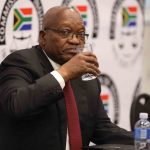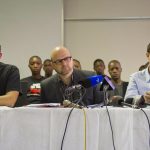Jacob Zuma will have his day in court
The National Prosecuting Authority has won the latest round in the fight for accountability after the high court dismissed the former president’s application for a permanent stay of corruption char…
Author:
11 October 2019

In a unanimous judgment, a full bench of the KwaZulu-Natal High Court in Pietermaritzburg has dismissed, with costs, former president Jacob Zuma’s application for a permanent stay of prosecution with regards to corruption, racketeering, fraud and money laundering charges.
“The seriousness of the offences that Mr Zuma is facing outweighs any prejudice, which he claims he will suffer if the trial proceeds. Furthermore, the reputational harm, which he claims to have suffered, goes hand in hand with being charged. In any event, this does not seem to have prevented him from ascending to the highest office in the country, being the president of the republic,” said Judge Bhekisisa Mnguni. Judge Thoba Poyo-Dlwati and Judge Esther Steyn concurred.
The charges relate to the government’s multibillion-rand arms deal in the late 1990s and were first filed following the 2005 conviction of Schabir Shaik, Zuma’s former business adviser. Shaik was found guilty of paying Zuma R1.2 million to protect and advance his business interests, and of securing a R500 000 annual bribe from French arms company Thales in return for the then ANC national chairperson protecting it from investigation with regards to the arms deal.
Nguni’s judgment detailed various legal precedents, including two Supreme Court of Appeal judgments that made critically adverse findings against Zuma and the Stalingrad legal approach he adopted.
The court systematically dismissed various arguments by Zuma’s counsel, which the National Prosecuting Authority (NPA) described in the main as “conspiracy theories”, when the matter was argued in May.
These appear to have emerged mainly from the apparent use of state intelligence resources to allege that Zuma was the subject of an unconstitutional political campaign by heads of the NPA and the now defunct organised crime-fighting unit, the Scorpions, in collusion with then president Thabo Mbeki, who sought to stymie Zuma’s political aspirations.
Prima facie case
Zuma’s legal counsel, Muzi Sikhakhane, had argued that his client had suffered prejudice – the “gravest travesty of justice” the court described it – when former prosecutions boss Bulelani Ngcuka announced in 2003 that while the NPA was proceeding with the prosecution of Shaik, it would not do so with Zuma despite having a “prima facie case”. This, Sikhakhane argued, caused reputational harm to his client and had thrown him into the “ever-biased court of public opinion”.
Zuma’s legal team had also argued that by not trying Shaik and Zuma together, the NPA was embarking on a “dry run” to test the potential success or failure of prosecuting their client later.
Mnguni found that “reasoning” the 2009 appeal court judgment in the 2009 matter of National Director of Public Prosecutions vs Zuma “commends itself to us as applying equally in this matter”.
Related article:
The judgment, penned by Judge Louis Harms, found the term “prima facie evidence … has more than one connotation and may mean, as Mr Ngcuka conveyed, that there may be evidence of the commission of a crime which is nonetheless insufficient to satisfy the threshold of a reasonable prospect of success, especially if regard is had to the burden of proof in a criminal case”.
Harms also finds that the guilt of one person – Shaik was successfully prosecuted – did not necessarily mean the guilt of another and that the NPA had to proceed carefully when gathering evidence as “evidence that may be admissible against the one may not be admissible against the other”.
The high court found that Zuma being denied a joint trial with Shaik “does not constitute prejudice of any kind, which would impact on the fairness of his trial”.
Conspiracy theory
On Zuma’s counsel’s contention that the decision to prosecute was motivated by a grand political scheme to ensure Zuma was tainted as a “corrupt leader”, but did not offer him recourse to clear his name legally, the court found “this argument fundamentally flawed”.
They found that because Shaik was to be charged, the NPA had to declare his relationship with Zuma and the bribe agreement he was supposed to have obtained for the former president from Thales, then called Thompson CSF.
They accepted the NPA’s argument that Ngcuka “felt obliged to explain to the public why he had decided not to prosecute” Zuma, despite the prima facie case disclosed by the indictment, “to avoid an inference” that the then deputy president was receiving special treatment.
The court also found that Ngcuka’s relationship with Mbeki or allegations that he was a supporter of the then president in the ANC’s leadership struggle in the build-up to its 2007 national elective conference in Polokwane “was immaterial as the prima facie evidence of corruption was there regardless”.
Pikoli recharges Zuma in 2005
Zuma’s legal team had argued that the decision by the new national director of public prosecutions, Vusi Pikoli, to reintroduce charges against Zuma in 2005 was flawed because there was no new evidence or special and exceptional circumstances to justify the reversal of Ngcuka’s earlier decision.
They also argued that the delay from announcing the charges in October 2006 and only indicting Zuma on 28 December 2007 was prejudicial against their client.
Related article:
The court found that this delay was understandable as the NPA was still building its case against Zuma. According to an affidavit by Pikoli, the Scorpions were still carrying out sensitive investigations that related to Zuma while fighting a legal battle he had brought to declare the search and seizure warrants used to obtain documents from the offices of his lawyer illegal.
The court found that the NPA had to wait for the results of Zuma’s challenge to the search and seizure warrants – documents seized from the offices of Zuma’s lawyer at the time, Michael Hulley, that may have had a bearing on its case – and Shaik’s appeals – unsuccessful at the appellate and constitutional courts – before proceeding with its case against Zuma.
“Any delay during this period is regarded as systemic and both parties are equally liable as they both participated in the litigation leading to the delay. As such, it is not open to Mr Zuma to complain about the delay,” the high court found.
The spy tapes saga
The so-called spy tapes were recordings of a conversation between then Scorpions boss Leonard McCarthy and Ngcuka, who was by that stage a former head of the NPA. In the conversations, held in the days leading up to the ANC’s Polokwane conference, the duo appear to be discussing when would be an optimum time to recharge Zuma.
The tapes were used to buttress Zuma’s narrative – public and legal – that he was the victim of a political conspiracy and thus his prosecution was politically motivated. Then NPA head Mokotedi Mpshe used the tapes in 2009 to drop the charges against Zuma, clearing him to ascend to the presidency.
The court averred to a decision by the appeal court on the spy tapes that found that even if Zuma’s accusation was true, “his contention will still be unsustainable because the SCA [appeal court] reiterated in National Director of Public Prosecutions vs Zuma that a prosecution brought for an improper purpose is only ‘wrongful if, in addition, reasonable and probable grounds for prosecuting are absent’”.
The court found that Zuma’s lawyers had not proven “that there are no reasonable and probable grounds for prosecuting Mr Zuma. Importantly, the challenges by Mr Zuma are not aimed at the merits of the case against him.”
The court found that the timing of the serving of the indictment against Zuma would not have prejudiced him.
The Browse Mole Report
The Browse Mole Report was apparently compiled by the Scorpions and claimed that the Angolan intelligence community was working to unseat Mbeki, who was president at the time.
Again, the high court averred to previous judgments by the appeal court, which found that the conduct of former Special Investigations Unit head Willie Hofmeyer and McCarthy in relation to the Browse Mole report “were considered to be diversionary and irrelevant as they were unconnected to the prosecution or the service of the indictment” against Zuma.
The high court noted that a full appeal court Bench had “held that there was no rational link between Mr McCarthy’s alleged conduct and Mr Mpshe’s decision to discontinue the prosecution. We align ourselves with this view.”
Mpshe’s 2009 decision
After initially reinstating charges against Zuma, Mpshe announced publicly in 2009 the withdrawal of those charges based on the spy tapes. However, the court found that in previous litigation brought by the Democratic Alliance in the appeal court, Zuma’s lawyers had conceded that Mpshe’s “decision to withdraw the charges against him was irrational and that a rational decision needed to be made”.
The court found that no case was made to prove that Mpshe’s initial decision to prosecute “was in any way politically motivated. Accordingly, the decision of the SCA in the DA review application paved the way for Mr Zuma to have his day in court, something which he is alleged to have expressed.”
The high court judgment is a trenchant legal rebuttal of many of the arguments – emotional and conspiratorial – that Zuma has made over the past 14 years to avoid facing the charges of corruption, fraud, racketeering and money laundering hanging over his head.
Considering Zuma’s penchant for Stalingrad lawfare, it is likely he will appeal the judgment. The tricky part is that the appeal court has already made critical and damning findings against him, something the KwaZulu-Natal high court judgment makes clear when referring to that legal precedent.


